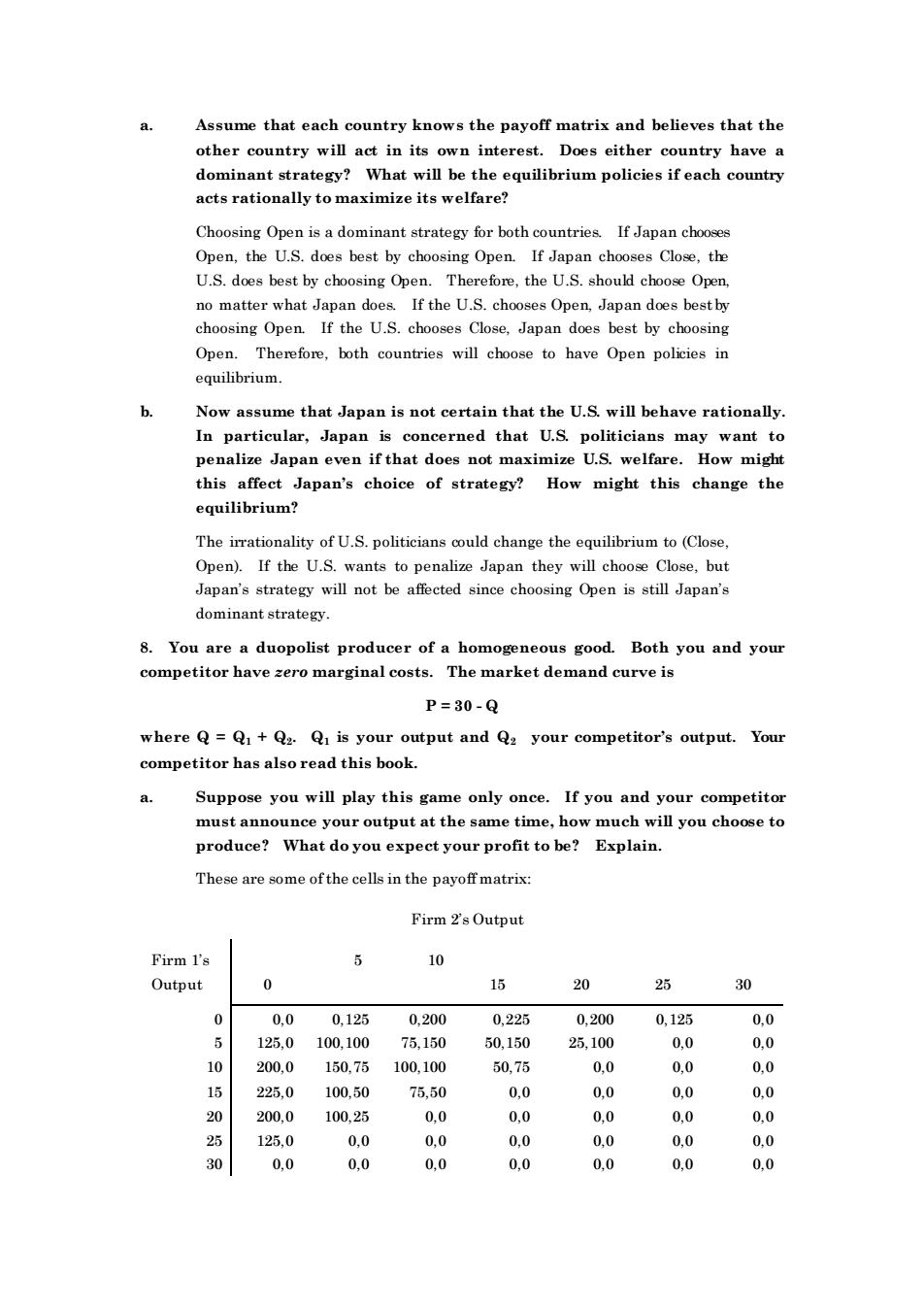正在加载图片...

Assume that each country knows the payoff matrix and believes that the other country will act in its own interest.Does either country havea dominant strategy? What will be the equilibrium policies if each country acts rationally to maximize its welfare? Choosing Open is a dominant strategy for both countries.If Japan chooses Open,the U.S.does best by choosing Open.If Japan chooses Close,the U.S.does best by choosing Open.Therefore.the U.S.should choose Open no matter what Japan does If the U.S.chooses Open,Japan does bes best by choo Open.Therefore,both countries will choose to have Open policies in equilibrium. Now assume that Japan is not certain that the U.S.will behave rationally. In particular.Japan is concerned that U.S politicians may want to penalie Japan even if that does not maximize U.S welfare.Howm this affect Japan's choice of strategy?How might this change the equilibrium? The irrationality of U.S.politicians could change the equilibrium to (Close Open).If the U.S.wants to penalize Japan they will choose Close,but Japan's strategy will not be affected since choosing Open is still Japan's dominant strategy. You are a duopolist producer of a hor eous go ood.Both you and vour competitor ha ve zero marginal costs.The market demand curve is P=30-Q where Q=Q+Qz.Qi is y output and Q your competitor's output.Your competitor has also read this book Suppose you will play this game only once.If you and your competitor must announce your output at the same time,how much will you choose to produce?What do you expect your profit to be?Explain. These are some of the cells in the payoff matrix: Firm 2's Output Firm I's 5 10 Output 0 15 20 0 0 0125 0,200 0,225 0,200 0,125 0,0 125.0 100,100 75.150 50.150 25,100 0.0 10 200.0 150,.75 100,100 50.75 0.0 0.0 0.0 76,50 0 00 125,0 0,0 00 0,0 00 0,0 0,0 0.0 0,0 0,0 0.0 00 a. Assume that each country knows the payoff matrix and believes that the other country will act in its own interest. Does either country have a dominant strategy? What will be the equilibrium policies if each country acts rationally to maximize its welfare? Choosing Open is a dominant strategy for both countries. If Japan chooses Open, the U.S. does best by choosing Open. If Japan chooses Close, the U.S. does best by choosing Open. Therefore, the U.S. should choose Open, no matter what Japan does. If the U.S. chooses Open, Japan does best by choosing Open. If the U.S. chooses Close, Japan does best by choosing Open. Therefore, both countries will choose to have Open policies in equilibrium. b. Now assume that Japan is not certain that the U.S. will behave rationally. In particular, Japan is concerned that U.S. politicians may want to penalize Japan even if that does not maximize U.S. welfare. How might this affect Japan’s choice of strategy? How might this change the equilibrium? The irrationality of U.S. politicians could change the equilibrium to (Close, Open). If the U.S. wants to penalize Japan they will choose Close, but Japan’s strategy will not be affected since choosing Open is still Japan’s dominant strategy. 8. You are a duopolist producer of a homogeneous good. Both you and your competitor have zero marginal costs. The market demand curve is P = 30 - Q where Q = Q1 + Q2 . Q1 is your output and Q2 your competitor’s output. Your competitor has also read this book. a. Suppose you will play this game only once. If you and your competitor must announce your output at the same time, how much will you choose to produce? What do you expect your profit to be? Explain. These are some of the cells in the payoff matrix: Firm 2’s Output Firm 1’s Output 0 5 10 15 20 25 30 0 0,0 0,125 0,200 0,225 0,200 0,125 0,0 5 125,0 100,100 75,150 50,150 25,100 0,0 0,0 10 200,0 150,75 100,100 50,75 0,0 0,0 0,0 15 225,0 100,50 75,50 0,0 0,0 0,0 0,0 20 200,0 100,25 0,0 0,0 0,0 0,0 0,0 25 125,0 0,0 0,0 0,0 0,0 0,0 0,0 30 0,0 0,0 0,0 0,0 0,0 0,0 0,0